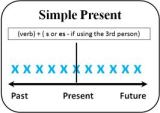 The Present Simple (also called the Simple Present) verb tense is very common in the English language, so it’s important to understand it well.
The Present Simple (also called the Simple Present) verb tense is very common in the English language, so it’s important to understand it well.
This post will show you how to use the Present Simple. To see how to form the Present Simple, click here.
1. Present Simple is used to talk about activities that happen repeatedly and things that we do regularly, such as habits and routines. Adverbs of frequency are often used with the Present Simple.
- I play golf every Monday.
- They often travel to China.
- She gets up at 8:00 every day.
- I don’t walk to school.
- She doesn’t love him.
- Do you smoke?
- How often do you study?
2. Secondly, we use the Present Simple to talk about factual information, such as general truths, scientific facts, or definitions.
- My teacher always arrives early.
- Water boils at 100 celsius.
- Doctors study for many years.
- The sky isn’t green.
- The word smart means “intelligent”.
3. We also use the Present Simple with stative verbs (non-action verbs) to talk about states or conditions, such as physical descriptions, feelings, relationships, knowledge, beliefs or possession.
- She is short and has long hair.
- They like strawberries.
- We want a new car.
- I promise I will help you.
- You look fantastic.
- They belong to the yacht club.
- I don’t know the answer.
4. We use the Present Simple to describe situations that are more or less permanent. (If a situation is new or temporary, use the Present Continuous)
- They work at a bank.
- I travel every summer.
- She has two daughters.
- Where do you live?
- He is married.
- I‘m not American, I‘m Canadian.
5. The Present Simple is also used with the Zero conditional.
6. We use the Present Simple to talk about what happens in books, movies, and plays.
- A young woman travels through Europe, where she meets different people, and finally falls in love.
- In this book, the hero saves the princess and marries her.
- The main character is very pretty and works at a café.
7. Future schedules, timetables, and fixed plans are expressed with the Present Simple, usually when they are set by an organization, not by us.
- School begins at 9:00 and ends at 3:00.
- The plane doesn’t arrive at 3:00, it arrives at 3:30.
- When does the movie start?
- The bus leaves every 15 minutes.
8. And lastly, we also use it to talk about the future after words such as “when”, “until”, “before”, “after”, and “as soon as”.
- He will call you when he has time. (Not ‘will have’)
- I won’t go out until it stops raining.
- I’ll give you the book before you go.
- I’m going to make dinner after I watch the news.
- She’ll come as soon as her babysitter arrives.
